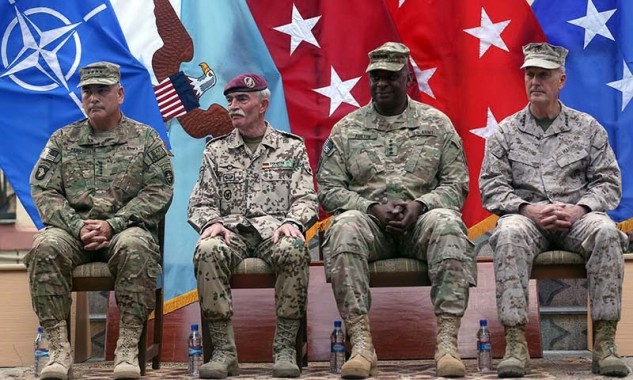
KABUL: US military leaders say it’s too soon to tell if Pakistan’s offensive against militants in North Waziristan has been effective or simply symbolic, but they say the operations have temporarily disrupted the enemy and sent insurgents fleeing into Afghanistan.
Marine Gen Joseph Dunford, who stepped down Tuesday as the top US commander in Afghanistan, said there’s no doubt that some fighters escaped across the border, along with displaced civilians trying to get away from the violence.
Frustrated US officials had long pressed Pakistan to move into North Waziristan, which has been a safe haven for militants including the al Qaeda linked Haqqani network.
The Haqqanis have used the region as a base to launch attacks against US, Afghan and coalition troops across the border in Afghanistan.
North Waziristan is considered a stronghold for a number of groups including the Pakistani Taliban, the Afghan Taliban and members of al Qaeda, and it has also served as a hub for militants seeking to overthrow Pakistan’s government.
Pakistan’s military launched the military assault named as ‘Zarb-i-Azb’ in June, but there were persistent questions about whether the army would actually go after the Haqqanis, and if the initial spate of airstrikes merely gave thousands of people, including insurgents, time to pack up and flee.
So far, said Dunford, “we didn’t see hundreds of fighters massing, or any significant level of violence increase that would indicate the enemy came from North Waziristan and was able to conduct operations inside Afghanistan. “
Dunford and Army Gen Martin Dempsey, chairman of the Joint Chiefs of Staff, said it’s still premature to judge the operations. “I think it’s too soon to say this has all been, you know, symbolic, or this has been less effective than it needs to be,”
Also watch: Miramshah in pictures: After the troops march in
Dempsey told reporters during a visit to Kabul this week for the US military’s change of command ceremony. “What will really matter is if they can complete all three phases; clear, hold and build. “
He said Pakistan’s military remains in the clearance phase of the operation and will now have to show it can hold the territory it gained.
Then, Dempsey added, it will be important for Pakistan to restore governance in that region that will be responsive to the central government in Islamabad.
If Pakistan is able to do that, he said, then the insurgents will have trouble if they try to re-enter the area.
“I think the important thing will be what comes out of it (the operation),” he said.
Dunford, who turned over command to Army Gen John Campbell Tuesday and then flew back to Washington with Dempsey, said it’s not clear yet whether the operations will have a lasting effect.
But, he said, “I do think it’s disrupted the enemy in the near term.” The key question, he said, will be whether the enemy is able to go back into the region once the operations are over.
The operation also comes as both Afghanistan and Pakistan work to form new governments.
That, said Dempsey, may help lay the groundwork for the two countries to work more collaboratively “on what is a very common interest, which is these insurgents that migrate back and forth across the border. “








